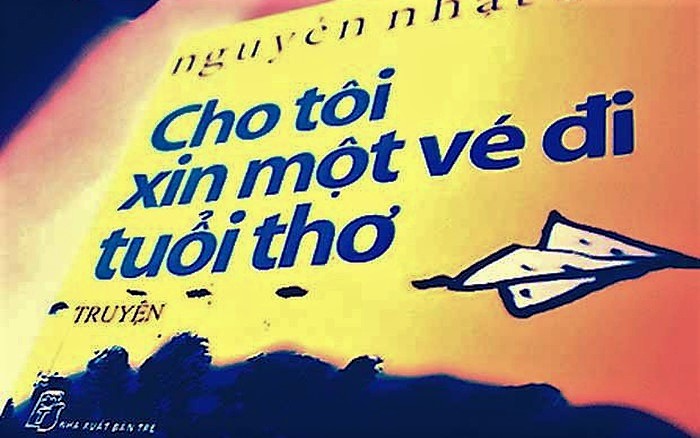A portrait of a curly boy on a yellowish book cover in a nearby bookstore captivated my eyes. I
purchased it.
Cho toi xin mot ve di Tuoi tho (Give me a ticket back to Childhood) by Anh N. Nguyen soon became
my most cherished book. This is the book that I could not put down when I was young, neither can
I now, nor will I put it down any time soon. The novel, narrated alternately by an 8-year-old Mui,
and (with commentary and judgement) by a 50-year-old Mui, tells the story of 4 children from the
same village: Mui, Hai, Tun, and Ti. The story is inexhaustible for me.

I love
Cho toi xin mot ve di Tuoi tho particularly since I could see the similarities between Mui, the protagonist,
and myself. At 8, we were both rebels: refusing to call a spade a spade, stealing the family’s bread
to feed stray dogs, digging up our neighbors’ yards to find hidden treasures, and calling for child-adult
equality. Why did children get reproached for doing bad things when adults did not? If ever frustrated
with parents or with school, I retreated to the book, trying to immerse myself in its hypothetical
world. The book was a Declaration of Independence for me and all the children of the world.
Yet, it was not until I turned 17 that the book made its most profound impact on me. At 17, I read
the book again and was filled with nostalgia. Images started to spring up in my mind: the Luong Van
Can pavements where we - the kids living in the same Old Quarter - used to play
o-an-quan (Mandarin Square Capturing) yet now fail to remember even the basic rules; the
tam-phan (a kind of wooden mattress often used in Asian countries) where we used to play
choi-chuyen (bamboo jacks) and then got reproached for playing with wooden sticks used for eating;
and the Vietnamese folk chant which we used to sing to play
Keo-cua-lua-xe: “Ong tho nao khoe ve an com vua” (The strong sawyer gets to eat king rice) that
keeps echoing through space and time.
Besides its nostalgic effect, reading
Cho toi xin mot ve di Tuoi tho somewhat turned my world upside down. The story, comparing a child’s
unstructured creativity with adult adherence to social norms, struck me. Previously, I thought adults
had more freedom than children, but this book made me think again. It is true that children are largely
dependent on their parents, but adults must submit and are subjected to a larger force - socially
constructed norms. Children, with their unconstrained creativity, can do whatever they want to make
life less bland (risking only reprimand if something goes wrong). But adults, they must compromise
between the things in society’s must-not-do list and the things in their to-do list, making life
bland. I was soon caught up with this concept in a paranoid haze. I wondered for how long I had lost
my freedom, and for how long I had subjected myself to the wills of others, recalling every time
I restrained myself from pursuing my own desires. I truly understood the title for the first time:
I wanted a ticket to childhood where my worries didn’t matter and I could be different without coming
across as outrageous.
I was sad upon reading this powerful book a second time: people change, and friendships can be towed
away by the swirl of the adult world. Tun (now a school principal) only reaches out to Mui (the writer)
the first time in thirty years to ask him, sadly, not to write about their childhood. After all,
no principal wants the public know to know about her “nasty” letter (“How about going to bed with
me this afternoon?”) from her childhood friend, though both were completely innocent in failing to
understand the meanings the adult world would assign to their words. I have my childhood friend too,
named Ti. I have not been in contact with him since I moved away from the Old Quarter in grade 6.
The story, though fun and entertaining for a child, is dark and nostalgic for an adult. People dread
loneliness the most, I think, but how many friends can a person keep throughout his life? This book
taught me that most friendships are fleeting. I wanted a ticket to childhood where friends are easy
to find and best friends are easy to keep.
Isn’t it strange? A desire to grow up consumed little me. A desire to come back consumed present
me. Since I can never go back to childhood, this book is magic for its inexhaustibility and its forever
presence in my mind.
Cho toi xin mot ve di Tuoi tho is the book I can never put down and take off my mind.